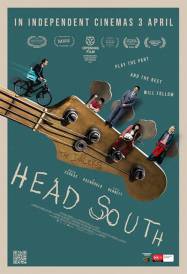Steve Plain SpinalCure's Project Edge Interview
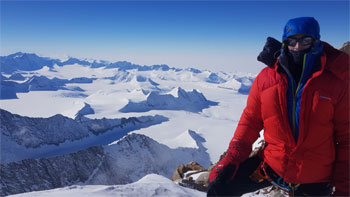
Surf Life Saving WA and SpinalCure Australia's Project Edge
In early 2018, Perth man Steve Plain will attempt to climb the highest peak on each of the world's seven continents in world-record time in support of Surf Life Saving WA and SpinalCure Australia's Project Edge.
Kicking off with Vinson in Antarctica in January 2018 and finishing on Everest in May, Project 7in4 will also include climbs on Aconcagua, South America; Kilimanjaro, Africa, Carstensz Pyramid, Australasia; Elbrus, Europe and Denali, North America.
Steve is aiming to complete the climbs in under 4 months which if successful will be a new world-record for completing the -7 summits', beating the current record of 126 days.
Steve was inspired to take the challenge after a simple accident at Perth's Cottesloe Beach in December 2014 that nearly left him paralysed for life.
After being dumped by a wave and driven head first into the sand, Steve lay partially paralysed, face-down in the water. Unable to breath, his initial concern was drowning. Fortunately, Steve's life was saved by the quick work of Cottesloe Beach volunteer surf lifesavers Lara and Gary Matier and friend Dave Field.
He was rushed to hospital under full spinal precautions and eventually told he had sustained multiple unstable fractures at the C2, C3 & C7 vertebrae as well as a contorted spinal cord, ruptured disc, dissected arterial artery, torn ligaments and more.
The prognosis was initially very poor as Steve was told by doctor's he may not regain full movement.
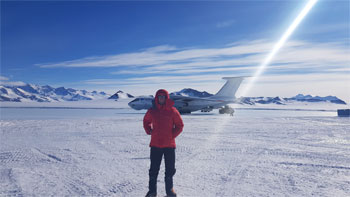 While spending an intensive time in the hospital and in a Halo brace, he committed himself to refusing the doctor's diagnosis - he was determined to not only walk out of hospital but to go on to climb the 7 summits, and so Project 7in4 was born.
While spending an intensive time in the hospital and in a Halo brace, he committed himself to refusing the doctor's diagnosis - he was determined to not only walk out of hospital but to go on to climb the 7 summits, and so Project 7in4 was born.
"Lying in a hospital bed with an uncertain prognosis was frustrating and frightening. I had never felt so weak or hopeless. But somewhere amongst all the self-pity, I made a promise to myself that I would come through this fitter and stronger than I was before."
Less than a year on from the date of the accident, Steve completed his first practice run on New Zealand's Mount Aspiring.
Steve's ambitious 7 summits dream will push him to new physical limits and he plans to stay motivated by focusing on using Project 7in4 to raise funds and awareness for two organisations that have become very close to his heart since the accident.
"Prevention is better than cure and that is why I want to raise awareness for the work that volunteer surf lifesavers do in performing rescues and minimizing injury on beaches around Australia. But accidents will always happen. For that reason I also want to support and help raise funds for SpinalCure's Project Edge program conducting cutting-edge research into spinal cord injury cure."
More information can be found at www.project7in4.com
Interview with Steve Plain
Question: Can you tell us about the challenge you are setting out on, in early 2018?
Steve Plain: I will be climbing the 7 summits, the highest mountain on each of the seven continents and plan to complete this in under 4 months. Or what I call Project 7in4. This will be a extreme test of my endurance, mental toughness and generally the ability to manage the strenuous physical challenge. Undertaking Project 7in4 is also an immense logistical challenge. Though, at the end of the day, success will also be heavily reliant on luck, luck to get the right weather windows at the right times. And this is something which no amount of training, preparation or planning can influence. I have recently completed the first of the 7 summits, Mt Vinson in Antarctica and if this is any indication for the rest of Project 7in4 I am very optimistic that I will conquer and complete this in World Record time.
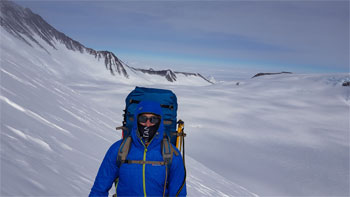 Question: What inspired this attempt?
Question: What inspired this attempt? Steve Plain: Three years ago, I was lying in a hospital bed with a broken neck and doctors told me I should be in a wheel chair, if not worse. It was a very low time, filled with self-pity, frustration and anger. But somewhere amongst that, refusing to accept the doctor's prognosis, I made myself a promise, I was going to walk out of that hospital and was going to climb the 7 Summits. A conservative treatment approach was determined and I was placed in a halo-brace for 4 months. Which, being in a woollen vest in the middle of a West Australian summer was not at all pleasant, for anyone! Though I didn't lose focus on what I needed to do to gradually regain my strength, build my endurance and become skilled in mountaineering.
Question: How have you been preparing for this adventure?
Steve Plain: Perth is pretty flat, which makes training for mountain climbing an interesting challenge. General cardiovascular endurance and strength training is vital and I spend a lot of time in the gym, pool or riding. Training for the specifics of uphill takes a little more imagination. So I am frequently training at Jacobs Ladder, a 242 step staircase, with a 30kg weight vest. However, to obtain the technical requirements of mountaineering you must go where the height is! I have completed a number of 'practice runs' to develop my technique. The first, only 333days after my accident, was Mt Aspiring, New Zealand, and last year saw me ascend Lhotse, Nepal which is 8516m, the 4th highest mountain in the world, and a very technical climb.
Question: Are you able to explain why you decided to support Surf Life Saving WA and SpinalCure Australia's Project Edge?
Steve Plain: My accident occurred at Cottesloe Beach, WA. I had just gone out for a short swim and on the way back to shore a wave dumped me head first into a sandbank. Had it not been for the rapid response and care provided by surf life savers that day, my future could have been extremely different. Their training in first aid and in particular spinal management, allowed them to correctly treat me without exacerbating the situation. As they say, prevention is better than cure, and the Surf Life Saving Association is at the forefront of preventing injuries at beaches around Australia.
The damage to my spinal cord, which had initially caused partial paralysis, was incurable and was informed that it would either heal by itself or I would be facing permanent paralysis. So, for all those not so fortunate, spinal cord injuries are one of the most debilitating injuries imaginable and the effects extend far beyond paralysis and loss of movement. It robs people of their independence and freedom. So that is why I am also supporting the outstanding, cutting edge work of SpinalCure's Project Edge and trust that one day there will be an answer and renewed hope for recovery after spinal cord injury.
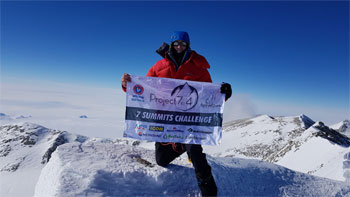 Question: How can Australians support you and Surf Life Saving WA and SpinalCure?
Question: How can Australians support you and Surf Life Saving WA and SpinalCure? Steve Plain: You can support me by following my journey and helping my story go viral and boost my Fundraising to reach my target. On my website project7in4.com you can donate through my Giving Back page, with all your donations going directly to my charities.
Now if completing the Everest Base Camp Trek is on your bucketlist and the thought of combining your epic adventure with raising awareness for these amazing, life giving charities, then take a look at an event I am hosting. You can trek to Everest basecamp and then join me just prior to my final ascent. Information is available at project7in4.com/giving-back/#ebc-trek
Question: Where can we follow your journey?
Steve Plain: I am traveling with a GPS tracker which will record my position as I complete my climbs. You can see the live tracker at project7in4.com/live-tracking. From this device I can send short message updates about where I am and what I am experiencing as I summit the mountains. Then once I am back down and in communication range I will post trip reports to my website, to which you can also subscribe.
Of course you can always find and follow me, Project7in4, on facebook and instagram.
Interview by Brooke Hunter
MORE

